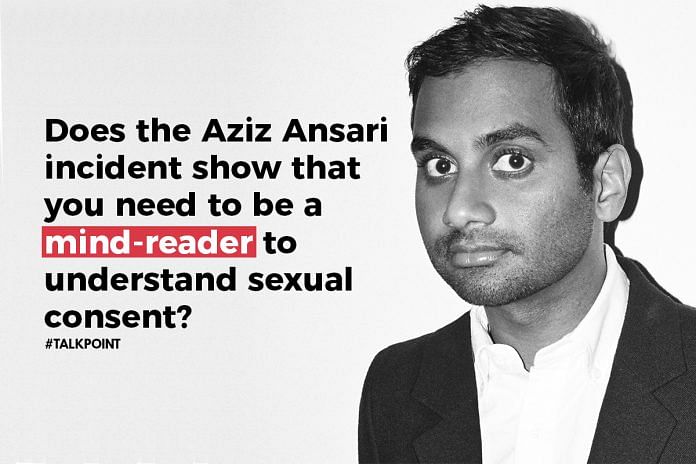The question of sexual consent and women’s agency has resurfaced after a woman anonymously called out comedian-actor Aziz Ansari’s sexually aggressive behaviour during a date.
ThePrint asks: Does the Aziz Ansari incident show that you need to be a mind-reader to understand sexual consent?
Learning to read each other’s bodies is basic to the act of having sex
 Paromita Vohra
Paromita Vohra
Mumbai-based columnist and creator-director of Agents of Ishq
This may happen for various reasons. If you don’t like the way your partner is proceeding, you may be uncomfortable. There are other issues like caste, class, age, employment context and various hierarchies that enter a sexual equation which can hinder a person’s ability to protest or refuse.
In a consensual relationship, there is also a kind of micro-consent that keeps occurring with things you like or don’t like, which are transmitted through the body and one has to be cognizant of it. Learning to read each other’s bodies is basic to the act of having sex with another person—it is what makes you a good lover. Consideration, awareness and mutuality is part of good sex.
Which brings us to why someone might be comfortable having sex with someone who is not comfortable with them. What makes you either genuinely or wilfully oblivious to another person’s responses?
And that is, in fact, because we live inside a larger envelope of misogyny and sexism, especially within heterosexual sex, where to not entirely see and relate to what another person wants becomes possible, even propagated in various ways. And men not caring how women may be feeling during actual sex—the idea of bad sex wherein both people don’t feel pleasure—is certainly linked to sexism and misogyny and is an aspect of it. That is why we need more and more accounts, which centralise female pleasure and which locate sex in female or trans experience, and not always in a particular male experience of sex.
That said, while bad, insensitive, and violating sex is generated from the same misogynist culture where assault is systematically accommodated and rape infrequently prosecuted. There is a distinction between harassment, assault, boorishness and high-level jerk behaviour and how we address these legally and socially.
Grace-Aziz Ansari was not ‘bad sex’, it was deliberate dehumanisation
 Shreya Ila Anasuya
Shreya Ila Anasuya
Writer, journalist, managing editor of Skin Stories at Point of View. She tweets at @shreyilaanasuya
If you went to shake someone’s hand, and they deliberately held their own hand back, would you grab it anyway? If someone you know intimately stops speaking to you, do you go on as though nothing has changed, holding a one-way conversation without even asking why the person has stopped reciprocating?
Are you a mind reader for not forcefully shaking the person’s hand when they are shrinking away? Are you indulging in a respectful, mutually consensual conversation when you perform intimacy without having done anything to earn it? One is a question of consent. And another is a question of genuine and reciprocal care, which is central to consent in any sexual encounter, no matter how fleeting.
I have a problem with the way this question is framed, which ignores both non-verbal cues and, crucially, the importance of this care. Non-verbal cues exist in all human interaction, and there is absolutely no reason for us to have one standard for sex and another for literally all other kinds of human contact.
If you read the Babe.com report by Katie Way, which contains Grace’s testimony, you’ll see that throughout their encounter, Grace made it clear, both non-verbally and explicitly, using her words, that she was uncomfortable. Even if Ansari did not understand the non-verbal cues, which is incredibly hard to believe, considering he has made a flourishing career out of performing his own wokeness and the politics of modern romance, it is clear that he deliberately ignored even her explicit refusal.
This is where the politics of care comes in. Ansari showed, again and again, that he simply did not care what she wanted. When she pulled away, he pursued her. When she said “next time”, he pretended that pouring another glass of wine constituted a ‘second date’, thus giving himself permission to start pursuing her sexually again, despite a clear refusal on her part. When she expressed her discomfort verbally again, he seemed to take her seriously, only to aggressively pursue his own pleasure again, completely ignoring her discomfort.
This is not ‘bad sex’. This is the deliberate dehumanisation of someone who has entrusted you with a romantic and sexual encounter. You don’t have to be a genius to understand that you need to care when the person you’re trying to sleep with needs to pause, stop altogether, or wants to take things slower. And you certainly, certainly don’t have to be a ‘mind reader’ to understand this either.
There is a need for men to just shut up and listen right now
 Abhinandan Sekhri
Abhinandan Sekhri
Co-founder and CEO of Newslaundry.com
A very sound suggestion I got when I wrote this piece some months ago, was that men should just sit this conversation out for now. Rational or not, this doesn’t need our intervention since it is time for us to just ‘shut up and listen’. There is much merit in that view.
However, there is one aspect I find troubling and so will weigh in and will limit my view to this. Because this debate is dominated by mostly women (and some men) in their thirties and forties (or older), by and large empowered, aware, fairly confident and articulate, it has become, in my view, so narrow and contextual to this worldview and experience. It completely ignores the large chunk who will encounter sexual misconduct, coercion, harassment, insensitivity and assault much more than those of us who are older.
And, if in this discussion everything is the same, with no acknowledgment to nuance and attention to specific words being used for specific actions with the understanding of the difference in each, it does more damage than good.
For teenagers, boys as well as girls and even young adults, intimacy is confusing, clumsy and often guilt-ridden (because of our unhealthy attitudes) among many other things that I won’t get into here. To not acknowledge that each of these—harassment, assault, casual sexism, misogyny, insensitive behaviour, aggressive behaviour awkward clumsiness—is different with different motivations, stimuli and outcomes, one risks causing more of a mess even while meaning well.
I think this debate lacks that aspect. We need younger people weighing in and not just middle-aged commentators. I do think it will be a revelation.
To say that Aziz Ansari incident dilutes #MeToo campaign is to condone his crime.
 Deeksha Bhardwaj
Deeksha Bhardwaj
Journalist with ThePrint
Let’s talk about power. Rich, famous, educated and male. Let’s talk about mindset. Proclaimed feminist, does support women’s campaign against sexual harassment.
Now, let’s talk about Aziz Ansari.
After being anonymously charged with having sexually assaulted a woman, the Aziz Ansari case has raised a plethora of issues. But let’s call a spade a spade, it is a case of gross male sexual entitlement. Euphemisms like ‘a bad date’, ‘an unpleasant encounter’, ‘non-consensual sex’ cannot absolve or condone Aziz Ansari’s behavior.
It is the symptom of a society that treats its women like property who can be claimed and discarded at whim. A society, that denies women the space to even have an opinion, let alone express themselves sexually. Isn’t that what we’re doing when we dismiss a highly traumatic experience as ‘revenge porn’?
“Clearly, I misread things in the moment and I’m truly sorry,” Ansari messaged her. The non-verbal cues that everyone seems to be highlighting as Ansari’s saving grace fell flat. She explicitly said ‘next time.’ She also said no. Maybe a feeble one, but a no. But he still imposed himself on her aggressively.
It is time to ask the problematic question: why didn’t he stop instead of asking why didn’t she leave? Let’s not even open the Pandora’s box that sexual consent is not about saying no, it is about saying yes. Otherwise, Brock Turner raping an unconscious woman behind a dumpster is completely legitimate. After all, she never said no.
Those calling Grace out for diluting the #MeToo campaign, are actually the torchbearers of that crime. It is they who are trivialising sexual assault by not giving due import to her side of the story. Wasn’t that what #MeToo was all about?
Wait, then again, some say she should have given him the opportunity to respond and is hiding behind anonymity.
If you remember the #MeToo cover that Time magazine did, you will realise in the corner is a faceless arm. Grace is that faceless arm. She is the victim of a structural problem that finds it easy to condemn the rapist on the street, but hushes their daughter about the sexual predators in the family.




Loved Deeksha Bhardwaj’s view on this. Please make this a separate article! Thank you for saying it so articulately.